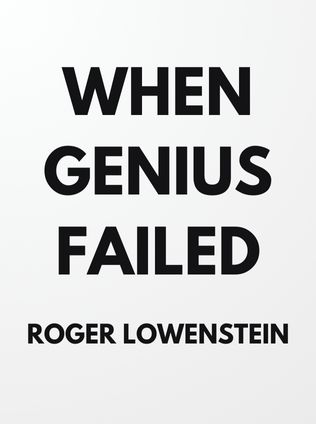
When Genius Failed
The Rise and Fall of Long-Term Capital Management
By Roger Lowenstein
Published 01/2000
About the Author
Roger Lowenstein is a renowned financial journalist and author, widely recognized for his ability to demystify complex financial concepts and events for a general audience. With a career that includes writing for The Wall Street Journal and authoring several bestselling books on finance, Lowenstein has established himself as a leading voice in financial journalism. His works often focus on the intersection of economics, human behavior, and financial markets, bringing clarity to the forces that shape our economic world. In When Genius Failed, Lowenstein explores the dramatic rise and fall of Long-Term Capital Management (LTCM), a hedge fund that epitomized both the potential and peril of financial innovation in the late 20th century.
Main Idea
The central thesis of When Genius Failed is that overreliance on mathematical models and the hubris of financial elites can lead to catastrophic outcomes in the world of finance. Roger Lowenstein chronicles the story of LTCM, a hedge fund that soared to unprecedented heights due to its sophisticated use of quantitative models, only to collapse spectacularly when those models failed to account for real-world complexities. The book serves as a cautionary tale about the dangers of overconfidence in financial strategies and the limits of human foresight in the inherently unpredictable world of financial markets.
Table of Contents
- The Rise of John Meriwether and the Birth of Quantitative Trading
- The Birth of Long-Term Capital Management (LTCM)
- LTCM's Stunning Initial Success
- The Fall of LTCM
- An Orchestrated Bailout
- A Tale of Hubris
The Rise of John Meriwether and the Birth of Quantitative Trading
The story of LTCM begins with John Meriwether, a pioneering figure in the world of arbitrage and quantitative trading. Meriwether made his mark at Salomon Brothers, where he led an arbitrage group that capitalized on price discrepancies in financial markets. His approach was rooted in the concept of convergence—the idea that the prices of similar financial instruments would eventually align. This strategy proved highly successful at Salomon Brothers, where Meriwether's team consistently generated substantial profits by exploiting market inefficiencies.
Meriwether's success at Salomon Brothers was due in large part to his use of mathematical models and computer algorithms to identify trading opportunities. These tools allowed his team to process vast amounts of data and make decisions based on complex statistical analysis, rather than relying solely on intuition or experience. This approach, known as quantitative trading, would later become the foundation of LTCM's strategy.
Sign up for FREE and get access to 1,400+ books summaries.
You May Also Like
Rich Dad Poor Dad
What the Rich Teach Their Kids About Money - That the Poor and Middle Class Do Not!
By Robert T. KiyosakiFreakonomics
A Rogue Economist Explores the Hidden Side of Everything
By Steven D. Levitt and Stephen J. DubnerThe Lean Startup
How Today's Entrepreneurs Use Continuous Innovation to Create Radically Successful Businesses
By Eric RiesWho Moved My Cheese?
An Amazing Way to Deal with Change in Your Work and in Your Life
By Spencer Johnson, M.D.Factfulness
Ten Reasons We're Wrong About the World – and Why Things Are Better Than You Think
By Hans RoslingMake Your Bed
Little Things That Can Change Your Life...And Maybe the World
By William H. McRaven



















